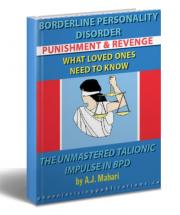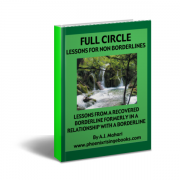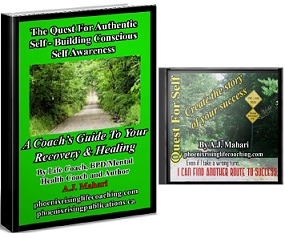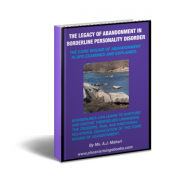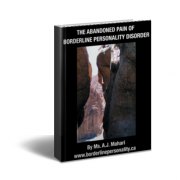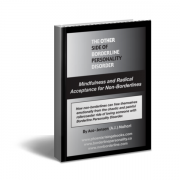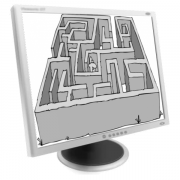Personal Responsibility Central To Recovery
From Borderline Personality Disorder
Borderline Personality Disorder (BPD), impacts the lives of those diagnosed with and those who care about them and/or love them, have to work with them, or share any time and space with them.
The traits that define what BPD actually is are found in the general population. That is to say, they are traits found in all of us. So, you might wonder, how come one person is diagnosed with BPD and the next one is not? It is a matter of the duration, frequency, and intensity of these traits and not just there mere presence that means the difference between a healthier personality or someone with a borderline personality.
Having a disordered personality is seriously impacting upon the life of those affected and all who they know and/or relate to.
Those with Borderline Personality Disorder, when in the active throes of BPD, and/or who haven't yet undergone treatment (therapy) for BPD, more often than not, are adults without many of the necessary skills to cope with and to function, emotionally in relating, in life in ways that are deemed appropriate.
A common and shared reality among those with BPD is that they have experienced an interruption in their emotional maturation process. It is this very interruption or inability to continue to develop emotionally, psychologically, for whatever reasons that those with BPD are unable to relate in ways that healthy and actually expected for whatever stage of life they are in and/or age they are at.
The results of this interrupted emotional maturation are the very self-destructive and (to others) crazy-making behaviour and attitudes seen and experienced from those with BPD.

Until one is treated the borderline may have little to no idea just how they are behaving or how they are impacting others. Much of their behaviour is driven by a lack of known self, a lot of pain which causes most with BPD to be very defensive at all costs. This coupled with an inability to honestly open up and be vulnerable and age-appropriate usually builds way more brick walls than it does bridges.
At the very same time those with BPD are in tremendous pain and need they act and speak in ways that drive others away more often than not. Many do not understand, that for example, their very profound fear of abandonment and/or loss will actually drive them act in ways that cause others to have to leave which they then experience as abandonment and loss.
The reasons why others do what they do in reaction to borderline behaviour is not clearly understood, if understood at all, by many with BPD. This causes those with BPD to, in effect, perceive the results of others reactions to their own behaviour as being imposed upon them as if they are being attacked, abandoned, put down, abused and so forth.
The actual actions and self-defeating behaviour of those with BPD are projected out onto others who are, for all intents and purposes, experienced by those with BPD as merely extensions of themselves (until they get into therapy).
It is this lack of conscious understanding and awareness as to the individuation of self and other
amid a fog of lost authentic self that leaves borderline acting and reacting out of his or her false self
and treating others truly as poorly as he or she usually treat him/herself.
During the course of growing up borderline one does a lot of damage to self and to others. A lot of the pain that one is in causes a lot of pain in the lives of those who love and care about someone with BPD.
There comes a point in beginning to recover where what one held out and projected upon others comes into a clear and very painful light - a light of realization that must then be transformed into the recognition of responsibility.
As important as learning to act, communicate, and behave in constructive and healthy ways that do not harm
oneself or others is, there is nothing more important to actual recovery than learning to take personal responsibility for
all choices made in one's life, conscious and/or subconscious choices that have hurt self and/or others.
In order to be able to recover one must develop a maturing sense of personal responsibility. It is not enough to just stop acting a certain way, or stop treating self and/or others a certain way.
You cannot have taken personal responsibility far enough if you haven't included:
- 1. stopping negative self-destructive and/or abusive acting in or acting out behaviour
- 2. choosing healthier more mature ways of relating and thinking and acting
- 3. apologizing for any and all hurtful things you brought to bear in the life of anyone else
- 4. making amends to those you hurt wherever possible forgiving yourself for what you may have done to yourself (self harm scars, lost opportunities and relationships etc)
- 5. being humble enough to ask for the forgiveness of those that you treated poorly, hurt, and/or abused
- 6. telling the truth and being true to yourself and admitting how you treated those you hurt most who are or were in your life
Taking personal responsibility for the pain that you have caused others is important. It is necessary to truly recover from BPD. It is all that can be offered to those you have hurt.
If you have BPD, and you have come to realize the grief you feel for actions and words that you have hurled at others genuine remorse must then be expressed to others in a heartfelt apology. It must be offered without any expectation. And offered only if the person you want to communicate to wants to listen. In other words, if someone has decided not to maintain contact with you and relationships have ruptured and/or been lost then being personally responsible means respecting other people's boundaries and understanding that the person who you may have hurt and his or her boundaries are more important than anything you now feel you want or need to say.
Most with BPD as they recover will see in the wake of their borderline years a path of destruction and devastation amid the populated reality of broken and lost relationships.
Apologizing, making amends, and taking personal responsibility for any and all pain that you have caused others as the result of borderline behaviour must be genuine and offered freely. It is not something to offer anyone with any expectation of re-connecting. It also cannot be offered in the seeking of any resolution with someone you have hurt whose time has long-since passed. Personal responsibility often means, as you continue to recover, you need to resolve your own feelings of loss, grief, guilt, shame, and regret.
If re-connection happens to be a possibility, it is best if it follows a period of congruent responsible behaviour after an apology is made.
If it is not even a remote possibility recovery rests on a much firmer foundation if you can still offer your apologies for what you regret having done to someone else.
This taking of personal responsibility also means that you do not stay stuck with old perceptions or focus on what may or may not have been done to you. You must truly let things go and grieve them and then take personal responsibility and apologize for any wrongs that you caused.
This is a gift to give oneself as well as any and all that one has hurt in the course of living a very difficult and painful way of life in the active throes of BPD.
© Ms. A.J. Mahari, August 31, 2005
A.J. Mahari is currently writing a memoir about her life and experience as a person who had two parents with Borderline Personality Disorder, as a person who was diagnosed herself with BPD at the age of 19 and from her perspective as someone who has recovered from BPD. There is a new section on her BPD Blog called The Diary - My Borderline Years where A.J. Mahari shares snipets of experience from her own life that is will give you just a taste of what her memoir will include.
Audio Program "Preparing For Recovery From BPD" Parts 1 & 2 by A.J. Mahari
Audio Program Rage Addiction in BPD by A.J. Mahari (sold separately or packaged with Mahari's Ebook, "Rage and BPD")
- Purchase all 3 of ebooks for NON BORDERLINES
- Non Borderlines - You can purchase 6 ebooks packaged together with or without audio.
- Those with BPD and/or Non Borderlines can purchase A.J. Mahari's 3 "Core Wound of Abandonment" series ebooks packaged together with or without audio.

No reproduction in whole or in part without the written consent of A.J. Mahari. To seek permission to re-produce anything on this site or to link anything on this site please email me at bpdinsideout@yahoo.ca - I do not give my consent for anything I've written to be re-produced on any other website without my expressed permission. If you wish to link to an article I've written please link directly to the article page on this site - thanks so much!






